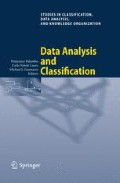Abstract
Missing data is a problem frequently met in many surveys on the evaluation of university teaching. The method proposed in this work uses multiple imputation by stochastic regression (MISR) in order to recover partially observed units in surveys where multi-item Likert-type scale are used to measure a latent attribute, namely the quality of university teaching. The accuracy of the method has been tested simulating missing values in a benchmark data set completely at random (MCR) and at random (MAR). A simulation analysis has been carried out in order to assess the accuracy of the imputation procedure according to two standard criteria: accuracy in “distribution” and in “estimation”. The procedure has been compared with others widely applied missing data handling methods: multiple imputation by chained equation (MICE) and complete cases analysis (CCA).
Access this chapter
Tax calculation will be finalised at checkout
Purchases are for personal use only
References
Agresti, A. (2002). Categorical data analysis. Hoboken NJ: Wiley
Berrington, A., & Borgoni, R. (2004). A tree based procedure for multivariate imputation. In Atti XLII Convegno della Società Italiana di Statistica. Cleup, Padova
Chambers, R. (2001). Evaluation criteria for statistical editing and imputation. National Statistics Methodological Series, 28, 1–41
Leti, G. (1983). Statistica descrittiva. Bologna: il Mulino
Little, R. J. A., & Rubin, D. B. (2002). Statistical analysis with missing data (2nd ed.), New York: Wiley
Rubin, D. B. (1976). Inference and missing data. Biometrika, 63, 581–592
Rubin, D. B. (1987). Multiple imputation for nonresponses in surveys. New York: Wiley
Schafer, J. (1997). Analysis of incomplete multivariate data. London: Chapman & Hall
Sulis, I. (2007). Measuring students’ assessments of ‘university course quality’ using mixed-effect models. PhD Thesis, Università degli Studi di Palermo
Van Buuren, S., & Oudshoorn, C. G. M. (2000). Multivariate imputation by Chained equations: Mice v1.0 users manual. Technical Report PG/VGZ/00.038, TNO Prevention and Health, Leiden
Van Buuren, S., & Oudshoorn, C. G. M. (2004). Mice: Multivariate imputation by Chained equations. R-package http://cran.r-project.org/web/packages/mice/mice.pdf
Author information
Authors and Affiliations
Corresponding author
Editor information
Editors and Affiliations
Rights and permissions
Copyright information
© 2010 Springer-Verlag Berlin Heidelberg
About this paper
Cite this paper
Sulis, I., Porcu, M. (2010). A Multiple Imputation Approach in a Survey on University Teaching Evaluation. In: Palumbo, F., Lauro, C., Greenacre, M. (eds) Data Analysis and Classification. Studies in Classification, Data Analysis, and Knowledge Organization. Springer, Berlin, Heidelberg. https://doi.org/10.1007/978-3-642-03739-9_53
Download citation
DOI: https://doi.org/10.1007/978-3-642-03739-9_53
Published:
Publisher Name: Springer, Berlin, Heidelberg
Print ISBN: 978-3-642-03738-2
Online ISBN: 978-3-642-03739-9
eBook Packages: Mathematics and StatisticsMathematics and Statistics (R0)

